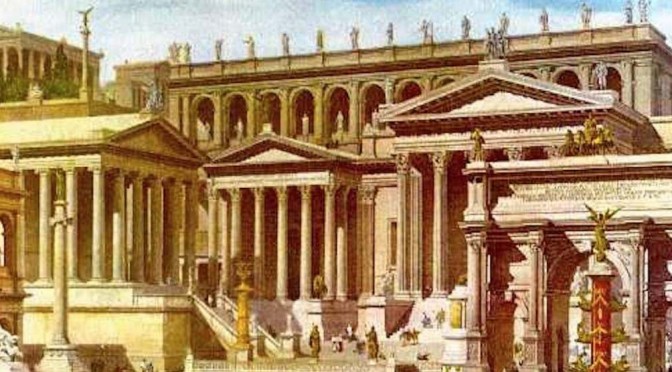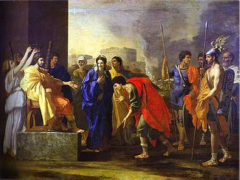Improvision
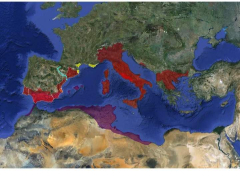 Fig 1 Victory in HispaniaVictories in Macedon (214) and Hispania in 206 meant that Senate then had to invent a way to govern a territories a significant distance from Rome. Again priority was given to Hispania. It was 148 before Rome finally occupied Macedonia and Greece. The Senate decided upon ayearly appointment of a Governor,with the territory becoming known as a Province. Initially Governors were appointed in the first year after being appointed Consul. The appointment was for one year only which from the Roman viewpoint limited the opportunity for corruption and avoided the temptation for the governor to establish a breakaway state.
Fig 1 Victory in HispaniaVictories in Macedon (214) and Hispania in 206 meant that Senate then had to invent a way to govern a territories a significant distance from Rome. Again priority was given to Hispania. It was 148 before Rome finally occupied Macedonia and Greece. The Senate decided upon ayearly appointment of a Governor,with the territory becoming known as a Province. Initially Governors were appointed in the first year after being appointed Consul. The appointment was for one year only which from the Roman viewpoint limited the opportunity for corruption and avoided the temptation for the governor to establish a breakaway state.
Military Rule
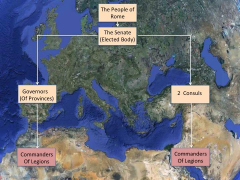 The Governor commanded all Roman military forces within his territory. An inherent part of these appointments was that these forces could be commanded without reference to the senate. He had other functions. He was responsible for the collection of taxes, the planning and management of major building projects, keep the peace and administer justice. In the Roman system a governor was immune to any accusation of wrongdoing during his term of office but could be prosecuted for impropriety when his term in office ended.
The Governor commanded all Roman military forces within his territory. An inherent part of these appointments was that these forces could be commanded without reference to the senate. He had other functions. He was responsible for the collection of taxes, the planning and management of major building projects, keep the peace and administer justice. In the Roman system a governor was immune to any accusation of wrongdoing during his term of office but could be prosecuted for impropriety when his term in office ended.
A standing army
.
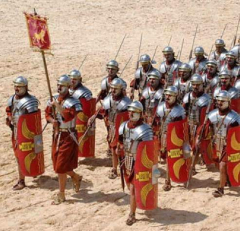 For this never ending process of expansion and war, Rome needed a standing armyThe main benefit of Roman Citizenship for those other than the patrician class was the ability to join a Legion. Legionaries were well paid and after ten years service could expect to retire in some style. Initially the patrician class provided all the cavalry and the officers for the army but soon they could not fulfil both duties
For this never ending process of expansion and war, Rome needed a standing armyThe main benefit of Roman Citizenship for those other than the patrician class was the ability to join a Legion. Legionaries were well paid and after ten years service could expect to retire in some style. Initially the patrician class provided all the cavalry and the officers for the army but soon they could not fulfil both duties
The Equestrians.
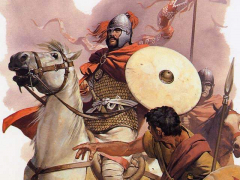 They reserved the officer positions for themselves and created a new social class to provide the cavalry. This new class was called the Equites, literally the horsemen. Membership of the Equestrian order was hereditary but dependant on wealth. Anyone who fell below the wealth threshold could be struck from the list. As time passed and the empire and the army grew steadily larger the Equestrians were allowed to take officer positions and wealthy plebs (honourable citizens) were allowed to become cavalry. Thus from the very early days of the empire the cavalry were considered to be a step above the foot soldiers.
They reserved the officer positions for themselves and created a new social class to provide the cavalry. This new class was called the Equites, literally the horsemen. Membership of the Equestrian order was hereditary but dependant on wealth. Anyone who fell below the wealth threshold could be struck from the list. As time passed and the empire and the army grew steadily larger the Equestrians were allowed to take officer positions and wealthy plebs (honourable citizens) were allowed to become cavalry. Thus from the very early days of the empire the cavalry were considered to be a step above the foot soldiers.
Wealth Creation
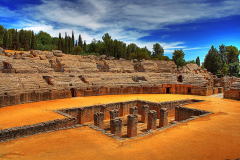 The wars themselves were an essential part of the Roman strategy, the increasing invincibility of the Roman army provided a clear display of the fact that it was better to be a part of Rome than fight against it.To provide control and improved cash flow as the empire expanded a proportion of the land in all client states or provinces was allocated to patricians. [/tab]
The wars themselves were an essential part of the Roman strategy, the increasing invincibility of the Roman army provided a clear display of the fact that it was better to be a part of Rome than fight against it.To provide control and improved cash flow as the empire expanded a proportion of the land in all client states or provinces was allocated to patricians. [/tab]
Cursus Honorum
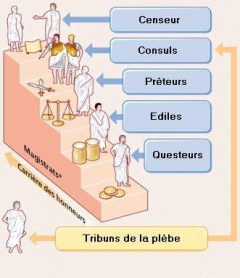 For patricians there was a established and relatively inflexible career path which led to fame and fortune, or of course, death.The Cursus Honorum interleaved military and political appointments, starting usually with ten years service in the cavalry, to give the wide range of experience needed to ascent to Rome’s most responsible position, that of Consul.However after BC 218 the reward for pursuing the Cursus Honorum became the almost inevitable appointment as Goveror of a province after a year as a consul though the appointment was limited to one year a governor could accumulate great wealth during his tenure
For patricians there was a established and relatively inflexible career path which led to fame and fortune, or of course, death.The Cursus Honorum interleaved military and political appointments, starting usually with ten years service in the cavalry, to give the wide range of experience needed to ascent to Rome’s most responsible position, that of Consul.However after BC 218 the reward for pursuing the Cursus Honorum became the almost inevitable appointment as Goveror of a province after a year as a consul though the appointment was limited to one year a governor could accumulate great wealth during his tenure
In the East
.
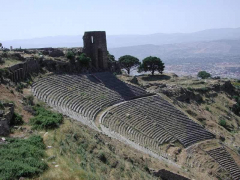 In the East, Macedon, Greece, Rhodes, Pergamon, Bithnia, Pontus, Judah, Syria and Egypt were all remnants of the Empire of Alexander the GreatThey were Hellenic city states which in the aftermath of Alexander’s empire had become kingdoms. with the exeption of Judah, all had the belief that they were the rightful successors of Alexander and therefore in competition with each other. They all took part in the Olypmic games in which the pleasure of competing was accompanied with a desire to demonstrate superiority. Once the Romans had found themselves catapulted into Hellenistic politics during and after the wars with Carthage their tactic became to become Greeks, to become yet another successor to Alexander and therefore an equal competitor for Alexanders Empire.[/tab]
In the East, Macedon, Greece, Rhodes, Pergamon, Bithnia, Pontus, Judah, Syria and Egypt were all remnants of the Empire of Alexander the GreatThey were Hellenic city states which in the aftermath of Alexander’s empire had become kingdoms. with the exeption of Judah, all had the belief that they were the rightful successors of Alexander and therefore in competition with each other. They all took part in the Olypmic games in which the pleasure of competing was accompanied with a desire to demonstrate superiority. Once the Romans had found themselves catapulted into Hellenistic politics during and after the wars with Carthage their tactic became to become Greeks, to become yet another successor to Alexander and therefore an equal competitor for Alexanders Empire.[/tab]
Client Kings
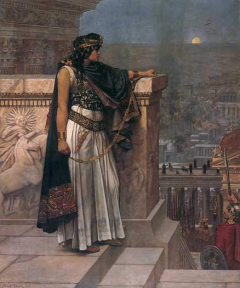 To the Hellenistic states the concept of a King or Emperor having possession of the wealth and control of the populace was familiar and acceptable. Absorbing client kingships proved to be a way of easing the process of Roman expansion.However the acceptance of client kingships plunged them into the intricate politics of the east. Overlayed on the importance of succession from Alexander, the Egyptians also believed they were the rightful successors of the Pharohs and the Syrians (Sassanids) believed they were the rightful successors to the Persians and the Jews believed themselves to be unique, a people chosen by God. A dangerous mix. Intermarriage, diplomacy, intrigue and treachery were all used as weapons in their struggle to achieve superiority. Nevertheless the Roman government seemed to work well in the east, particularly across the Aegean in Anatolia.[/tab]
To the Hellenistic states the concept of a King or Emperor having possession of the wealth and control of the populace was familiar and acceptable. Absorbing client kingships proved to be a way of easing the process of Roman expansion.However the acceptance of client kingships plunged them into the intricate politics of the east. Overlayed on the importance of succession from Alexander, the Egyptians also believed they were the rightful successors of the Pharohs and the Syrians (Sassanids) believed they were the rightful successors to the Persians and the Jews believed themselves to be unique, a people chosen by God. A dangerous mix. Intermarriage, diplomacy, intrigue and treachery were all used as weapons in their struggle to achieve superiority. Nevertheless the Roman government seemed to work well in the east, particularly across the Aegean in Anatolia.[/tab]
Hispania
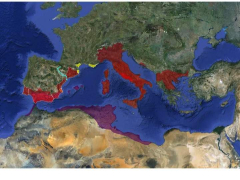 Fig 11 Victory in HispaniaThough something similar was tried several times, the concept of client kings did not work in Hispania.
Fig 11 Victory in HispaniaThough something similar was tried several times, the concept of client kings did not work in Hispania.
In Hispania the Eastern and southern coastlines had been conquered by Carthage and were occupied by Iberian peoples. It was possible for Rome to substitute itself for Carthage in these areas.
The Celtic World
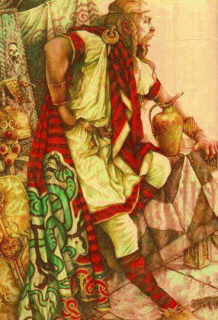 The Romans quickly discovered that the peoples of the central plain and the northwest were Celtic. It was in Hispania that the need for a different way of dealing with Celtic tribes was identified.
The Romans quickly discovered that the peoples of the central plain and the northwest were Celtic. It was in Hispania that the need for a different way of dealing with Celtic tribes was identified.
They cared nothing for the Roman preoccupation in distinguishing other states as “allies” (related by treaty), “subjugates” (fought and surrendered to Rome) or “Enemies” (no surrender but conquered). They knew that the end result was always the same, Roman colonies created roman enclaves within their territory, imposed taxation and forced memers of the clan into service in the Roman army.However if a Roman Consul, General or Governor beat them in the field or even if one of them could put a bigger army in the field than they could themselves, then they were prepared to submit and accept the victor as their “High King”. Even then the Celts demanded self government and distribution of wealth to the whole clan. It return for this they were prepared to co-operate with Rome but always as an equal.
Inconsistency
What they could not understand was that a Roman High King they had accepted as a result of his prowess was replaced, usually less than twelve months later.In the eyes of the Celts the role of High King was personal not institutional so the new appointee had to re-establish their right to the role of High King. Nor could they understand the total change in character, ethics and strategy from one governor to the next. The first governor could be considerate in his treatment of those he vanquished, others murdered indiscriminately even those who sought treaties with the Romans.
